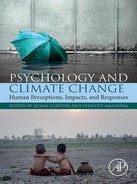Preface
Climate change is one of the most pressing issues facing society. Often described as an environmental problem, it is better understood as a human problem: human behavior is largely responsible, human beings will be affected, and human behavioral change will be required. The role of psychology in understanding and addressing this problem is not widely recognized, however, despite a large and growing body of relevant research. This book is designed to survey recent psychological research on a range of relevant topics. Each chapter presents a review of what is known in the area as well as a new perspective on human perceptions, impacts, and responses to climate change.
Taking a psychological perspective implies an emphasis on people’s thoughts, emotions, and behavior; it stresses the scientific method, in which theory is used to guide hypotheses, and data are collected to test the hypotheses; and it is oriented, implicitly or explicitly, toward the promotion of human wellbeing. These papers deliberately reflect on the process of theory-building and/or hypothesis-testing in order to more clearly demonstrate the value of a psychological approach. Underlying all is the goal to promote the involvement of psychologists and psychological research in interdisciplinary collaborations to address climate change.
The first section of the book addresses the psychology behind perceptions of climate change. Chapter 2 discusses factors that influence people’s acceptance that climate change is occurring; Chapter 3 describes what we know about climate change communication; Chapter 4 illustrates the importance of social context in climate change communication through a case study of a program designed to promote accurate conversations about climate change; and Chapter 5 explores the role of social identities such as race and class in affecting experiences and perceptions of climate change.
In the second section, we move to human responses. Chapter 6 classifies the human behaviors that contribute to climate change, discussing which might be the most promising targets for interventions on the basis of their potential impact and amenability to change. Chapter 7 presents a taxonomy of the barriers that prevent or inhibit positive behavioral responses, describing how this perspective could help to guide more promising behavioral interventions. Chapter 8 considers collective behaviors in response to climate change, and discusses possible benefits of collective action for individual wellbeing.
The third section of the book presents research on psychological impacts of climate change. Chapter 9 reviews the broad range of impacts that can be expected, from acute impacts on individual mental health to changes in social networks and community wellbeing. Chapter 10 discusses individual factors that might promote risk or resilience to the threat of climate change. Finally, Chapter 11 takes a community-based perspective on risk and resilience.
The challenge of climate change can only be met through the combined efforts of scientists from many disciplines alongside policymakers and other public officials. Our hope is that this volume will help both psychologists and others to recognize the potential contributions from psychology.
